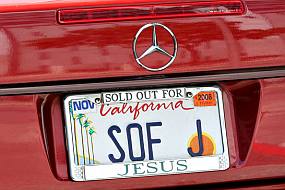When my wife and I lived in Silicon Valley (that’s the South San Francisco Bay area for the geographically business challenged), we’d routinely encounter folks who would brag about chucking their tech jobs to run a bed & breakfast or start an organic farm. The appeal of that break from the typical grind for something more idyllic became even more engrossing when the Dot Com bubble showed initial signs of bursting.
Couple after couple were successfully negotiating the move from being beholden to The System to charting their own destiny—well, who wouldn’t love to break out of that stranglehold and find a new way to live?
What they don’t tell you of the New American Dream story is that folks who make this sort of change are rich. Or were rich. Because the way to a small fortune as a bed & breakfast owner or an organic farmer is to start with a large fortune.
But who talks about that? Don’t be a downer, right?
Over the last couple weeks I’ve written about voices preaching that the only genuine Christian life is the one that is radical for Jesus (“Radicalism and Reality (A Response to ‘Here Come the Radicals!’),” “God’s Promises and Their Fulfillment: How Much Is the Church’s Responsibility?,” and “Kids, Systems, and Success (A Response to Brant Hansen’s ‘Your Kids Don’t Need Your Stupid Success Track’)“). This is the hot, new clarion call coming from some well-known pastors/leaders of churches and parachurch organizations that cater to the rich or upper middle class.
Only the utterly sold out are truly Jesus’ followers, they claim. Everyone else is duped—and possibly on their way to hell.
Because I think the Church in America is increasingly out of touch, that should be a message that resonates with me. But it doesn’t.
I have a problem with pulpit-preached messages that sound great on the surface but come with no practical way to make them happen. It is one thing to tell me about a radical life sold out for Jesus but quite another to model it for the rest of one’s life and in such a way that others can emulate it.
Isn’t there something off about a pastor of a church of rich people talking about being radical for Jesus? When that pastor claims to live radically, is he really doing so? If he and his family got in financial straits for their “radicalness,” wouldn’t one phone call to the elder with connections result in a “rescue” check showing up within half a day? How radical are you truly when you live off the donations of people who are not as sold out for Jesus as you claim to be? So they fund your radicalness yet go to hell because they weren’t as radical as you?
If he and his family got in financial straits for their “radicalness,” wouldn’t one phone call to the elder with connections result in a “rescue” check showing up within half a day? How radical are you truly when you live off the donations of people who are not as sold out for Jesus as you claim to be? So they fund your radicalness yet go to hell because they weren’t as radical as you?
Really?
And how radical are you really when you have no chance of failure? When you can simply press rewind and go back to doing what you did before you got radical? How painful is it when you started with a large fortune and ended up with a small one, but a small one nonetheless?
Then there’s the poorer working class schlemiel who hears that radical message, takes it to heart, and gets in trouble because he didn’t calculate the cost of entry to being radical and didn’t have a cushion when he fell.
“Do not think that I have come to bring peace to the earth. I have not come to bring peace, but a sword. For I have come to set a man against his father, and a daughter against her mother, and a daughter-in-law against her mother-in-law. And a person’s enemies will be those of his own household. Whoever loves father or mother more than me is not worthy of me, and whoever loves son or daughter more than me is not worthy of me. And whoever does not take his cross and follow me is not worthy of me. Whoever finds his life will lose it, and whoever loses his life for my sake will find it.
—Matthew 10:34-39 ESV
We know the words of Jesus, don’t we? What I don’t think we know is how to apply them to our lives today.
For all the talk of being radical for Jesus, how do we actually live it?
America 2013 is not an agrarian culture. We don’t teach our children animal husbandry. We don’t weave fabrics from plants we grew to make our own clothes. We aren’t fishermen by trade. We’ve farmed out large chunks of the kinds of things people did in Bible times to others to do for us. That’s how our economy works. We’re all niche players in a way that people didn’t use to be.
Today, the cost of entry into our society is a college degree. A private college costs $50,000 a year for many kids. And many employers now demand a master’s degree. Some kids end their schooling six figures in debt.
How radical for Jesus can you be when a bank owns you?
Unless you live in a city in America, you need a car. And a car costs money. A lot of it. The United States developed differently; it’s not Europe, where you can walk to work or to the grocers. Our spread-out-ness changes things. There’s a different, higher cost.
In fact, everything about America costs—and much more than some are willing to admit.
Many years ago, I worked for a ministry that didn’t pay very well. I think I made $60 a week. I didn’t have a lot of debts, but I still had some, so I needed to supplement that income by asking people for financial support. I raised four times what I really needed and secured a lot of promises from people. In the end, that support dried up within months, and I was quickly under what I needed to meet my meager obligations. I had to quit that ministry.
I have been a Christian since I was a teenager. As much as it pains me to admit this, I don’t know how to live the kind of sold-out-for-Jesus life that I hear talked about by these preachers of radicalness. I don’t know how to make it work.
I don’t think I’m alone, either.
Is it as easy as selling all you have and giving it to the poor? What it your spouse doesn’t share your radicalness? What if you have a mentally challenged child? What if all the donations that support your radicalness dry up and you end up failing? Is failure even possible for the genuine, sold-out Christian? Where does radicalness end and “thou shalt not put the Lord thy God to the test” begin? When can one “put down the plow” and not look back, and when does one need to fulfill existing obligations? When can you rely on the Church to bury your dead for you and take care of any widowed parents you leave behind?
Here’s where I struggle: If preachers of radicalness are right, then almost all of us are in trouble. The question then is, what do we do to get out of that trouble in a practical way?
No one really talks about that, though.
What does a genuinely radical life lived for Jesus look like in America 2013? And how do people make that work in a way that isn’t fluffy bunnies and unicorns?
Or is radicalness by nature always impractical? And if it is, what do we do when we go for the impractical and fail? Are American churches ready to support and dust off those folks who embrace the radical life and yet blow up once, twice, thrice? Or is the message of radicalness one that sounds good on the surface but is simply impossible to enact unless we Christians change everything about the system in which we live?
I should have an answer, but I don’t. That I don’t seems like a failure both of the American Church and of my own discipleship. Maybe we’ve abandoned too much of the infrastructure needed to make such a radical life possible. Maybe our role models let us down. Maybe the Spirit has been trying to get a word in edge-wise, but the clamor of the American Way of Life has drowned Him out to the point that we don’t even know what He sounds like anymore. Maybe it’s simply too late for all of us to change.
It is one thing to tell us the engine of our car is broken. It is another to fix it. It is quite another to teach us how to diagnose and fix it ourselves with guidance from wise mechanics who already know what must be done to fix it and can pass that practical, step-by-step wisdom onto us, and who will bear with us when we don’t fix it right the first time.
If we don’t find those people soon, we’ll never get this thing running right and never get to our destination. At least that’s what we keep hearing.
 They HEAR an ideological distinction espoused, but they don’t see it lived.
They HEAR an ideological distinction espoused, but they don’t see it lived.
 If he and his family got in financial straits for their “radicalness,” wouldn’t one phone call to the elder with connections result in a “rescue” check showing up within half a day? How radical are you truly when you live off the donations of people who are not as sold out for Jesus as you claim to be? So they fund your radicalness yet go to hell because they weren’t as radical as you?
If he and his family got in financial straits for their “radicalness,” wouldn’t one phone call to the elder with connections result in a “rescue” check showing up within half a day? How radical are you truly when you live off the donations of people who are not as sold out for Jesus as you claim to be? So they fund your radicalness yet go to hell because they weren’t as radical as you? On Monday, I wrote concerning
On Monday, I wrote concerning